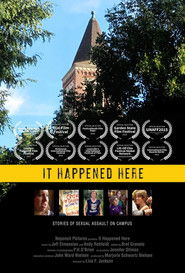
Video Sources 0 Views

Synopsis
Watch: It Happened Here 2014 123movies, Full Movie Online – Through the intimate portraits of five student survivors, IT HAPPENED HERE exposes the alarming pervasiveness of sexual assault on college campuses, the institutional cover-ups and the failure to protect students, and follows their fight for accountability and change on campus and in federal court..
Plot: Through the intimate portraits of five student survivors, IT HAPPENED HERE exposes the alarming pervasiveness of sexual assault on college campuses, the institutional cover-ups and the failure to protect students, and follows their fight for accountability and change on campus and in federal court.
Smart Tags: N/A
Find Alternative – It Happened Here 2014, Streaming Links:
123movies | FMmovies | Putlocker | GoMovies | SolarMovie | Soap2day
Ratings:
Reviews:
Incredible, heart-wrenching, must see! But one note about law enforcement…
Incredible, heart-wrenching film. It Happened Here effectively highlights the complexities of individual victims’ challenges to find justice after campus sexual assault. But it explores far more than the personal experiences of the women shown. College administrators and professors discuss varied (and sometimes conflicting) perspectives on sexual assault awareness and legal obligations for protecting students. This brings to life a snapshot of victims’ impact and ways that colleges all too often re-victimize these students by responding so poorly.The only aspect I wish was represented more thoroughly in the film is the role of police, and not just campus police. Viewers who aren’t familiar with the topic could walk away from this thinking these women were ignorantly asking their colleges to play policemen when they should have gone straight to law enforcement. I really resent that misunderstanding. I came across an article that two of the girls interviewed (one from my hometown) published back in May that addressed this issue better than I can explain it. Here’s the link and a few key quotes- http://goo.gl/lmMd4d
“Seven Reasons Students Report Sexual Assault to Colleges”
“…A growing number of colleges (currently 90) face federal review for Title IX violations in administrative response to incidents of sexual assault. Recent study results released by the U.S. Department of Justice show that only 20% of college-enrolled female sexual assault victims report the crime(s) to the police, compared to 32% of non-students, leaving many wondering why victims would report sexual assault incidents to their schools in the first place.
Title IX … prohibits gender-based discrimination, including sexual violence, and compels federally funded academic institutions to report and respond to incidents violating this right. The U.S. Department of Education’s Office for Civil Rights directs institutions in upholding Title IX and other rights, reporting crime incidents and statistics, and abiding by standards mapped out in the “Dear Colleague” letters.” … “Given the influx of investigations regarding Title IX compliance, campus resources face increasing pressure to specify administrative roles when a student reports an emergency to internal or external authorities. Although different colleges operate within the nuances of their distinct policies, several common factors inform students’ crime-reporting behaviors:
1. Emergency Calls Directed to On-Campus Police
Many colleges staff not only security guards but fully accredited police forces that have primary or concurrent jurisdiction for incidents occurring on or near campus. These officers often work alongside local authorities, especially in instances of criminal investigations, but they are the first response when someone dials 911 anywhere on campus – from any phone, at any hour. Victims and witnesses have the option to call a local police station’s phone number but may be directed to campus police anyway, depending on the location and victim’s needs. Likewise, if a victim’s call is connected to an emergency communications center, any resulting dispatch services may send or notify campus officials. For incidents occurring on or within a few blocks of these campuses, victims wishing to circumvent campus police would have to call a local police station directly, leave campus to call 911, or request to be forwarded on to a local unit.
2. Campus Police Response Time
Campus security/police officers have a number of advantages (e.g. proximity, familiarity with campus layout, access to buildings and security camera footage) in responding to emergencies more quickly than local authorities. Additionally, many campuses employ centrally located phones or “blue light” systems that enable victims and witnesses to summon emergency services at the touch of a button. These phone and “blue light” locations are easily identifiable and accessible, and many campuses ensure response times as quickly as 90 seconds.”
“4. Campus-Specific Safety Accommodations More Immediately Available
Colleges tend to complete investigations, hearings, and appeals in a significantly more timely manner than legal procedures. Waiting even a few months for a court date can majorly disrupt one’s academic timeline. Administrators are required by federal law to inform victims of their Title IX rights and are forbidden to discourage or deter external legal action (violation of this requirement is a major component of current compliance reviews). The college’s investigation is not intended to replace criminal procedures and may run concurrent to any legal investigation. However, administrators can facilitate interim accommodations (e.g. stay-away orders, residential reassignments, escorts, restricted building access) that enable the victim to feel safe on campus regardless of any investigatory status or ruling for the alleged offender(s).”
“6. Immunity Policies for Students Reporting Crime
Many colleges enact some form of immunity policy for students reporting an incident, submitting a crime tip, or contributing to an investigation when the student victim/witness might otherwise refrain for fear of incriminating oneself (e.g. when underage drinking or drug use is involved). In these instances, campus security representatives and administrators often determine a counseling or rehabilitation course for student informants to complete in place of harsher disciplinary consequences. Such options may not be possible when reporting to local authorities.”
“Many institutions are, clearly, failing to properly facilitate these policies and prioritize victims’ rights. In no way do I discourage anyone from reporting incidents to law enforcement or suggest that any college is better equipped to support victims or hold perpetrators accountable than external legal resources. I simply intend to address survivors’ actions and institutional requirements in response to increasing public inquiry and criticism. Ideally, victims can access both law enforcement and campus resources to receive collaborative support services. When one hypothetically considers an incident of sexual violence, it is easy to conclude a course of action given limited, abstract detail. However, we must remember that there are likely many reasons why a victim “didn’t just go to the police,” such as a desire to focus on personal convalescence within the campus community. We can respectfully advocate for justice while bearing in mind that it is not the victim’s responsibility to enact reform.”
Review By: ellecal
Incredible, heart-wrenching, must see! But one note about law enforcement…
Incredible, heart-wrenching film. It Happened Here effectively highlights the complexities of individual victims’ challenges to find justice after campus sexual assault. But it explores far more than the personal experiences of the women shown. College administrators and professors discuss varied (and sometimes conflicting) perspectives on sexual assault awareness and legal obligations for protecting students. This brings to life a snapshot of victims’ impact and ways that colleges all too often re-victimize these students by responding so poorly.The only aspect I wish was represented more thoroughly in the film is the role of police, and not just campus police. Viewers who aren’t familiar with the topic could walk away from this thinking these women were ignorantly asking their colleges to play policemen when they should have gone straight to law enforcement. I really resent that misunderstanding. I came across an article that two of the girls interviewed (one from my hometown) published back in May that addressed this issue better than I can explain it. Here’s the link and a few key quotes- http://goo.gl/lmMd4d
“Seven Reasons Students Report Sexual Assault to Colleges”
“…A growing number of colleges (currently 90) face federal review for Title IX violations in administrative response to incidents of sexual assault. Recent study results released by the U.S. Department of Justice show that only 20% of college-enrolled female sexual assault victims report the crime(s) to the police, compared to 32% of non-students, leaving many wondering why victims would report sexual assault incidents to their schools in the first place.
Title IX … prohibits gender-based discrimination, including sexual violence, and compels federally funded academic institutions to report and respond to incidents violating this right. The U.S. Department of Education’s Office for Civil Rights directs institutions in upholding Title IX and other rights, reporting crime incidents and statistics, and abiding by standards mapped out in the “Dear Colleague” letters.” … “Given the influx of investigations regarding Title IX compliance, campus resources face increasing pressure to specify administrative roles when a student reports an emergency to internal or external authorities. Although different colleges operate within the nuances of their distinct policies, several common factors inform students’ crime-reporting behaviors:
1. Emergency Calls Directed to On-Campus Police
Many colleges staff not only security guards but fully accredited police forces that have primary or concurrent jurisdiction for incidents occurring on or near campus. These officers often work alongside local authorities, especially in instances of criminal investigations, but they are the first response when someone dials 911 anywhere on campus – from any phone, at any hour. Victims and witnesses have the option to call a local police station’s phone number but may be directed to campus police anyway, depending on the location and victim’s needs. Likewise, if a victim’s call is connected to an emergency communications center, any resulting dispatch services may send or notify campus officials. For incidents occurring on or within a few blocks of these campuses, victims wishing to circumvent campus police would have to call a local police station directly, leave campus to call 911, or request to be forwarded on to a local unit.
2. Campus Police Response Time
Campus security/police officers have a number of advantages (e.g. proximity, familiarity with campus layout, access to buildings and security camera footage) in responding to emergencies more quickly than local authorities. Additionally, many campuses employ centrally located phones or “blue light” systems that enable victims and witnesses to summon emergency services at the touch of a button. These phone and “blue light” locations are easily identifiable and accessible, and many campuses ensure response times as quickly as 90 seconds.”
“4. Campus-Specific Safety Accommodations More Immediately Available
Colleges tend to complete investigations, hearings, and appeals in a significantly more timely manner than legal procedures. Waiting even a few months for a court date can majorly disrupt one’s academic timeline. Administrators are required by federal law to inform victims of their Title IX rights and are forbidden to discourage or deter external legal action (violation of this requirement is a major component of current compliance reviews). The college’s investigation is not intended to replace criminal procedures and may run concurrent to any legal investigation. However, administrators can facilitate interim accommodations (e.g. stay-away orders, residential reassignments, escorts, restricted building access) that enable the victim to feel safe on campus regardless of any investigatory status or ruling for the alleged offender(s).”
“6. Immunity Policies for Students Reporting Crime
Many colleges enact some form of immunity policy for students reporting an incident, submitting a crime tip, or contributing to an investigation when the student victim/witness might otherwise refrain for fear of incriminating oneself (e.g. when underage drinking or drug use is involved). In these instances, campus security representatives and administrators often determine a counseling or rehabilitation course for student informants to complete in place of harsher disciplinary consequences. Such options may not be possible when reporting to local authorities.”
“Many institutions are, clearly, failing to properly facilitate these policies and prioritize victims’ rights. In no way do I discourage anyone from reporting incidents to law enforcement or suggest that any college is better equipped to support victims or hold perpetrators accountable than external legal resources. I simply intend to address survivors’ actions and institutional requirements in response to increasing public inquiry and criticism. Ideally, victims can access both law enforcement and campus resources to receive collaborative support services. When one hypothetically considers an incident of sexual violence, it is easy to conclude a course of action given limited, abstract detail. However, we must remember that there are likely many reasons why a victim “didn’t just go to the police,” such as a desire to focus on personal convalescence within the campus community. We can respectfully advocate for justice while bearing in mind that it is not the victim’s responsibility to enact reform.”
Review By: ellecal
Other Information:
Original Title It Happened Here
Release Date 2014-01-01
Release Year 2014
Original Language en
Runtime N/A
Budget 0
Revenue 0
Status Released
Rated Not Rated
Genre Documentary, Crime, Drama
Director Lisa F. Jackson
Writer N/A
Actors Kylie Angell, Anna Chapman, Erica Daniels
Country United States
Awards 1 win & 1 nomination
Production Company N/A
Website N/A
Technical Information:
Sound Mix N/A
Aspect Ratio N/A
Camera N/A
Laboratory N/A
Film Length N/A
Negative Format N/A
Cinematographic Process N/A
Printed Film Format N/A
Original title It Happened Here
TMDb Rating 7 1 votes













